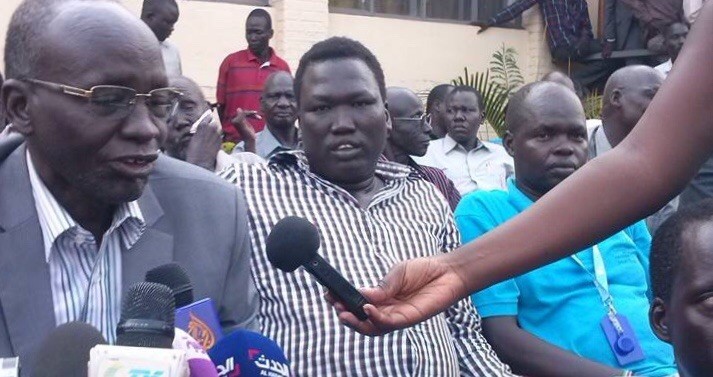South Sudanese rebels released on Thursday an ethnic Dinka official whom they had abducted off a humanitarian aircraft in Jonglei State. After his return from the ordeal, the official Isaiah Chol Aruai said he thought his release was a sign of peace.
Aruai, head of the national statistics bureau, was forced off a UN World Food Programme helicopter together with two other ethnic Dinkas when the helicopter made a stop at a rebel-held airstrip at Jiech area in Ayod County, while traveling between two government-held areas.
The official was released yesterday and received at Juba airport by a crowd including senior government officials and relatives.
Speaking to press, Aruai said he was thankful to God for saving their lives. He explained that he had been detained because of his ethnicity, since ethnic Dinkas are not allowed into the area controlled by SPLM-IO where their aircraft had touched down.
Referring to the SPLM-IO rebels who control the Nuer-inhabited Jiech area, Aruai said, “After they realized we were from the Dinka ethnic group, we were told there is an outstanding order in the area by the military governor that Ugandans and Dinkas are not supposed to access the areas for whatever reason, for various reasons.”
“But in short, we were arrested and we were investigated but we were humanely treated, we were not mistreated. …The SPLA [IO] soldiers who were there were very good, they handled us professionally, but then there were some youths around — you know, this area is inhabited by people whose sons might have been killed during the struggle. So the feeling is still very high.”
“Particularly for me when they know that I am a government employee, it created some serious concern. The rest of my colleagues they work with UN but their crime was simply being from Dinka ethnic group. But in any case the officer who was in command, he’s a Lieutenant Colonel called Gatjang, decided to control the situation, to the extent that he took us to his own house for protection,” he recounted.
He said later that night also the military governor Gabriel Duop Lam was contacted by radio and he gave assurances that nothing would happen to them, but he said that the location where they were was not secure, so he ordered them to walk elsewhere.
“In fact we walked the whole night. We started at eight in the evening… and we arrived at the station where [Gen. Duop] is at 8 a.m. the following day. So we were exhausted. He went and met us, he talked to us and he assured us that we were secured.”
After this he said he also spoke on the phone personally with Riek Machar, who had been pressured by the UN and other opposition politicians including SPLM-G10 member Majak D’Agoot to release the men.
“It was a very, very serious situation where we were. But I think God works in a very mysterious way,” he said.
“We were treated well, even today when we left they have to slaughter a goat for us as a farewell. When we came to the airport the military governor also came to the airport, he waited for us until we took off. That is the time we left the airport. So we thank him for his humane way he was treating us.”
He also thanked the UN security team that brought them out.
Asked what lessons are to be learned from the experience, he advised people not to use any UN flight unless they know the direction that it is going, “so that you don’t fall in the same problem we fell in.”
Secondly, he said he thought the incident was a sign that “peace will come.”
“The question is when. And everybody is yearning for peace… one day Southern Sudanese will come together regardless of ethnic background. That is the lesson we have learned from that.”
Meanwhile, WFP spokesman George Fominyen told reporters on Thursday in Juba that they were appreciative of the decision of the rebel leadership to release the officials, who had been trying to return from Juba after attending the inauguration of an episcopal bishop in Twic East.
However, a UN statement was critical of the rebels for detaining the officials in the first place. WFP said, “It is unacceptable to harass or detain people traveling on a humanitarian asset.”
“We call on all parties to recognize and respect the neutrality of these humanitarian flights and to refrain from interfering with the delivery of lifesaving humanitarian assistance to people in need,” added the UN agency.




